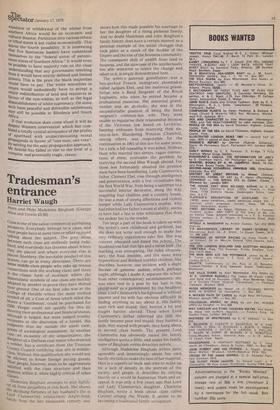Tradesman's entrance
Harriet Waugh Peers and Plebs Madeleine Bingham (George Allen and Unwin £5.50) Class is one of the safest commercial publishing Prospects. Everybody belongs to. a class, and most people have at some time or other enjoyed talking about the subject. The grey areas between each class are endlessly being redefined, and everybody has theories about where they are placed and where everyone else is Placed, Snobbery, the inevitable product of this s'Ystem, can go in many directions. There are some middle-class people who rake up tenous Connections with the working class; and there is the classic form of snobbery where the Materialistic symbols of one class are quickly adopted by another to prove they have shifted their ground. One of my first jobs was at the College of Heralds where the most rarified 1.._sYmhol of all, a Coat of Arms which titled the bearer a 'Gentleman', could be purchased for F-250. People could not qualify for this by showing their professional and financial status, although it helped, but were judged worthy recipients at the discretion of a herald. His Judgment thus lay outside the usual categories of sociological assessment. In another c.„-ase, an ex-nanny of my acquaintance, the 'laughter of a Durham coal miner who married a Welder, has a certificate from the Taunton c ,t3lintY Council certifying that she is middleclass. Without this qualification she would not hl allowed to house foreign paying guests. Most people, however, seem to be aggressively _satisfied with the class structure and their Pusition Within it, while highly critical of other classes.
Madeleine Bingham attempts to play lightly the all these prejudices in this book. She shows
e declining fortunes of her husband's (he is Lord Clanmorris) aristocratic Anglo-Irish f airlilY from the late nineteenth century and
shows how this made possible his marriage to her, the daughter of a rising plebeian family.
And no doubt Madeleine and John Bingham's family history does have a certain interest as a personal example of the social changes that took place as a result of the decline of the Empire and the rise of the business community. The consequent shift of wealth from land to business, and the slowness of the intellectually less able aristocrat to notice the change and adapt to it, is amply demonstrated here. The writer's paternal grandfather • was a hen-pecked French immigrant shoemaker called Jacques Ebel, and her maternal grandfather was a Band Sergeant of the Royal Engineers, who when he retired became a professional musician. Her maternal grandmother was an alcoholic; she was in the uncomfortable position of being the band sergeant's common-law wife. They were unable to regularise their relationship because of the Victorian law based on Leviticus, banning widowers from marrying their sisters-in-law. Blundering Winston Churchill, among others, was responsible for the 'continuation in 1901 of this law for some years; for a lark, a bill repealing it was killed. Holman Hunt who married two sisters, vague connections of mine, overcame the problem by marrying the second Miss Waugh abroad. For those less fortunately situated the position must have been humiliating. Lady Clanmorris's father, Clement Ebel, rose through intelligence and. perseverance, with a few vicissitudes like the first World War, from being a salesman to a successful interior decorator, along the way acquiring four children and a country house. He was a man of strong affections and violent temper while Lady Clanmorris's mother, who had inherited her father's musical ability, seems to have had a line in trite witticisms that does not endear her to the reader.
Too large a part of the book is taken up with the writer's own childhood and girlhood, but she does not write well enough to make her very ordinary experiences take fire. She was convent .educated and hated the school. The headmistress had thin lips and a mean look, the teaching was uninspiring, the rules unnecessary, the food inedible, and the nuns were hypocritical and disliked truthful children. She describes, however, one incident with a slight flavour of genuine sadism which perhaps might, although I doubt it, separate the school from other contemporary establishments; she was once tied to a post by her hair in the playground as a punishment by the headmistress. Lord Clanmorris's background is without interest and his wife has obvious difficulty in finding anything to say about it. His family were rich and stupid; they hunted a lot and fought battles abroad. Then when Lord Clanmorris's father inherited the title the family became poor and stupid; they hunted a little, they stayed with people, they hung about in second class hotels. The present Lord Clanmorris has obviously raised the family intelligence quota a little, and under his family ' name of Bingham writes detective novels:
Although Madeleine Bingham writes more agreeably and interestingly about her own family she fails to make the best of her material. Hers is a superficial book and tries to make up for a lack of density in the portrait of the society and people it describes by relying heavily on a would be humorous 'them and us' appeal. It was only a few years ago that Lord and Lady Clanmorris's daughter, Charlotte Bingham, wrote a book about class called Coronet among the Weeds. It seems to be becoming a traditional family occupation.


























 Previous page
Previous page